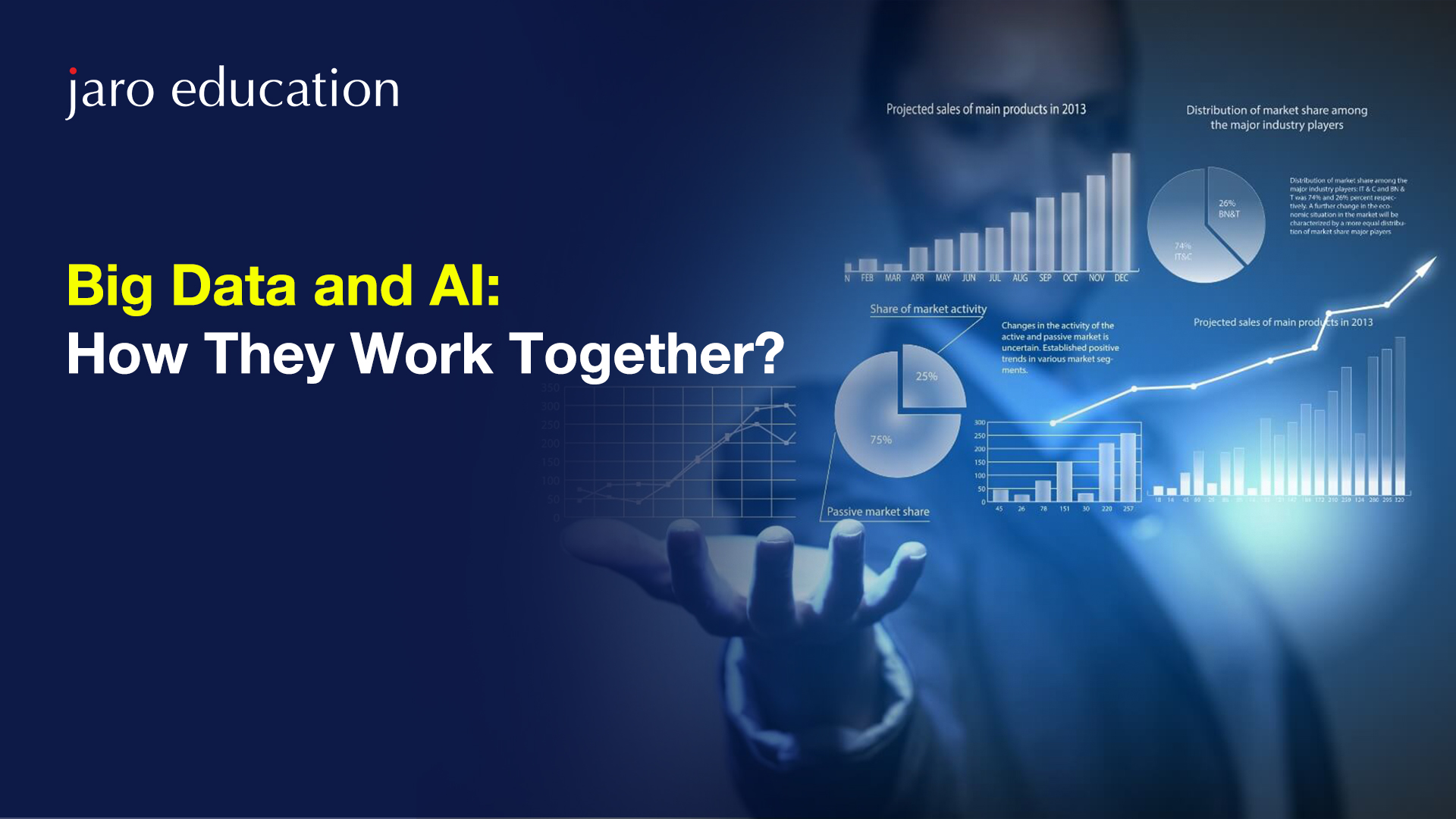Big Data and Artificial Intelligence: How They Work Together?
Introduction
Big Data and Artificial Intelligence have become the most sought-after technologies in recent times. They have already shown promising results and rapid technological breakthroughs. According to a survey by PwC, the global GDP will increase by 14% due to AI alone. This potential of AI to lead organisations is helping in quick business turnaround.
According to the same survey, the global GDP will increase by 14% due to AI alone, which has led to the rise in exciting new career opportunities in both these areas. It further forecasted that there will be 30 million AI jobs by 2030. Companies are willing to offer rewarding paychecks and exciting opportunities but only to skilled individuals with an advanced degree, such as a Masters of Science in Artificial Intelligence.
Artificial Intelligence and Big Data are two different tools with the ability to bring to life the unthinkable. Artificial Intelligence allows machines to perform tasks similar to human cognitive powers, and AI-enabled systems can make intelligent decisions without any human involvement.
A Masters of Science (M.Sc.) in Artificial Intelligence can help understand how AI analyses and interprets the available data for performing tasks just like humans do, but in a better, faster, and more accurate way. Big Data, on the other hand, refers to the enormous amounts of data that are available. It involves techniques employed to process this data quickly and has a high success value for organisations today.
Artificial Intelligence and Big Data Together: The Possibilities
Artificial Intelligence and Big Data are closely interconnected. Both the data related technologies work well together to bring in amazing results in the following ways:
- The movie recommendations Person X gets on Netflix are different from the recommendations that Person Y gets. How does Netflix know the difference in their movie choices?
While Big Data has helped organisations in ways unimaginable in the past, it has no value without a mechanism that can analyse it. Humans cannot analyse such vast amounts of data efficiently. Therefore, data-scanning and Artificial Intelligence algorithms are the only ways to manage this enormous amount of data resourcefully.
This efficient data analysis has increased the demand for professionals with a Master’s degree in Artificial Intelligence.
- Big Data provides the training data required by AI algorithms. However, learning never ceases in AI. Even after the initial training is over, AI continues to learn from the new data to adapt itself to the changes in data. Big Data is a continuous necessity for AI. The specially designed curriculum of the M. Sc. in Artificial Intelligence degree emphasises that Artificial Intelligence would not exist without Big Data.
- Big Data and Artificial Intelligence are complementary to each other. In fact, Artificial Intelligence becomes smarter when supplied with more data.
- Artificial Intelligence and Machine Learning can analyse and detect anomalies in data. With thorough knowledge earned from M. Sc. in Artificial Intelligence, one gains professional knowledge to eliminate any unwanted result from data processing that could otherwise translate into a considerable loss for the enterprise.
- Artificial Intelligence can utilise Big Data to predict and determine the probability of a future result. For example, a timely forecast of natural disasters using a combination of AI and Big Data can save lives in the future.
- Artificial Intelligence can recognise data patterns in Big Data. An M. Sc. in Artificial Intelligence can teach how to utilise AI pattern recognition to study or predict new data patterns. For example, the image or pattern recognition function of AI is a part of almost every mobile phone now, which registers as much data as possible before the face recognition and speech recognition features are enabled in them.
Conclusion
To summarise, Big Data is raw data that needs to be worked upon before it becomes beneficial, and Artificial Intelligence is the intelligent output obtained after processing the data.
The development of Big Data depends on the data analytics Artificial Intelligence offers. On the other hand, Artificial Intelligence itself requires a lot of data to develop and function deftly and intelligently.
Data scientists and AI experts with an M. Sc. in Artificial Intelligence are assets for any business. The shortage of skilled data and AI workforce is a major obstacle to the productivity of leading companies. Choose a program that will provide in-depth knowledge of business operational data and the latest AI tools, making you a leading AI expert.
In times like these, when travel is not feasible for all, the Master’s degree in Artificial Intelligence offered by IU International University of Applied Sciences and LSBU (London South Bank University) is apt for those who seek a future in Big Data or AI.
AI is driving revolutionary changes in healthcare, mechanical and automotive engineering, science, etc. For a career in remoulding these sectors to industries of the future, join the state-of-the-art Master of Science Degree Programme (specialisation in Artificial Intelligence) from IU International University of Applied Sciences and LSBU today.
This degree will also pave the way for your career towards international shores. Where does exploration begin, and exploitation start? During this degree, you will be finding the answers to these meaningful questions by positioning your learnings in an ethical context. Drive impactful social change in your career with technical expertise in AI with this degree.






